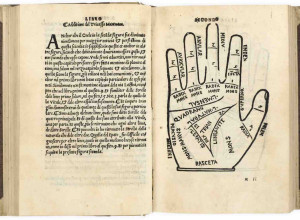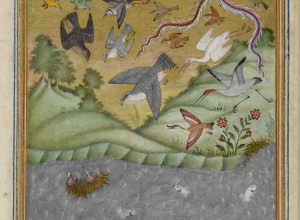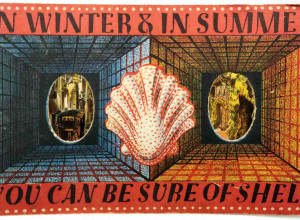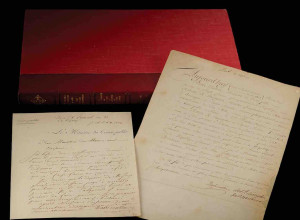Around the World in Eighty Days with the Real Phileas Fogg
In 1870, the eccentric American transportation entrepreneur George Francis Train took a trip around the world in eighty travel days (with a two-month stopover in Paris), so when Jules Verne published his bestselling Around the World in Eighty Days in 1873, Train was quick to claim, "Verne stole my thunder. I'm Phileas Fogg." Ever the competitor--and self-publicist--Train undertook a total of three trips around the world, each time attempting to beat the record. His final trip clocked in at sixty days.  No doubt he was a well-traveled man, and here's one of his passports to prove it. Train's 1857 passport is one of many such documents that went on exhibit last month in Passports: Lives in Transit at Harvard's Houghton Library. Issued to Train by the American Delegation in Great Britain, but written in French, which was at the time the language of international relations, this passport records his jaunts to Tuscany, Florence, and the Papal States. (This was long before he ran for president, published an obscene newsletter, or bankrolled Susan B. Anthony.)
No doubt he was a well-traveled man, and here's one of his passports to prove it. Train's 1857 passport is one of many such documents that went on exhibit last month in Passports: Lives in Transit at Harvard's Houghton Library. Issued to Train by the American Delegation in Great Britain, but written in French, which was at the time the language of international relations, this passport records his jaunts to Tuscany, Florence, and the Papal States. (This was long before he ran for president, published an obscene newsletter, or bankrolled Susan B. Anthony.)  Curated by Lucas Mertehikian and Rodrigo Del Rio, the exhibition also follows the paper trails of other nineteenth- and twentieth-century travelers, émigrés, and refugees like Russian revolutionary Leon Trotsky, physicist Gertrude Neumark Rothschild, and author/activist Shirley Graham Du Bois, and calls attention to larger geopolitical issues.
Curated by Lucas Mertehikian and Rodrigo Del Rio, the exhibition also follows the paper trails of other nineteenth- and twentieth-century travelers, émigrés, and refugees like Russian revolutionary Leon Trotsky, physicist Gertrude Neumark Rothschild, and author/activist Shirley Graham Du Bois, and calls attention to larger geopolitical issues.
"I realized the weight of what we were doing when we first opened George Train's passport," commented Del Rio. "This 19th-century American businessman claimed to be the inspiration for Around the World in Eighty Days. He basically could travel anywhere he wanted. Differently from the case of Leon Trotsky, who was continuously fleeing, or W.E.B. and Shirley Du Bois, who renounced their American citizenship due to pressure from the government, finally finding home in their ancestral Africa. Freedom of movement was thus unevenly distributed. The cosmopolitan desire of making the whole world your home was a dream only some people could have."
The exhibition remains on view through August 18.
Images: Houghton Library, MS Am 2763 (12). Courtesy of Houghton Library, Harvard University.
















